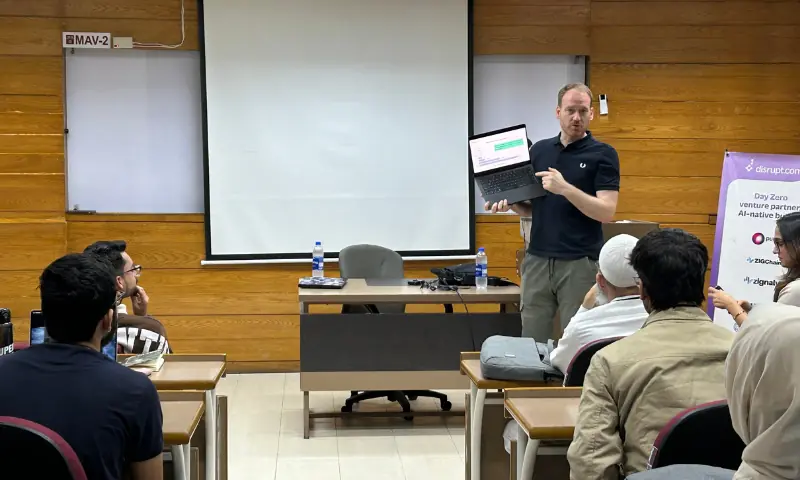Amid Pakistan’s burgeoning but fragile entrepreneurial ecosystem, students at Karachi’s Institute of Business Administration (IBA) gathered on Thursday for an interactive session on venture creation and how artificial intelligence is speeding up the process of building and scaling startups.
The event, organised at the university’s main campus, featured Dr Jonathan Doerr, senior vice president at Disrupt.com (formerly Gaditek), who shared insights from 15 years of experience as an entrepreneur and investor.
“Who among you is using ChatGPT on a daily basis?” Dr Doerr asked, prompting (predictably) multiple hands to go up.
He highlighted that while the telephone took years to reach one million users, OpenAI’s ChatGPT achieved the same milestone in just five days, a fact confirmed by the company’s president and co-founder Greg Brockman.

“Open AI and other [large] language models enable a new wave of companies that are built,” Dr Doerr said, pointing out the example of the startup Lovable, which reached a $100 million annual recurring revenue (ARR) in eight to nine months.
ARR is a metric used to measure revenue an organisation generates over the course of one year. According to Dr Doerr, an ARR of $100m is a feat other companies have taken six or more years to achieve.
He explained how new ‘vibe coding’ tools allow even non-technical founders to generate fully functional websites and applications through simple prompts.
Vibe coding, a term coined by AI researcher Andrej Karpathy in early 2025, describes a workflow where the primary role shifts from writing code line-by-line to guiding an AI assistant to generate, refine, and debug an application through a more conversational process.
Dr Doerr said this shift is enabling “a completely new generation of founders” who no longer need large engineering teams to build prototypes or early-stage products. According to him, ‘big players’ like OpenAI, as well as competitors like Gemini, Meta, and Grok, provide the technological backbone allowing startups to accelerate much faster.
“We live in a time where everyone can very easily build things for the world; the barriers that maybe were there in the past are lower because of AI, because of the vibe coding platforms,” he told Dawn. “Is there a problem people have that you can solve? That’s the number one question you should ask yourself. And I don’t think there’s any limit to that.”
Dr Doerr showed a highly realistic AI-generated video, noting that while AI can dramatically speed up the creative process, “content expertise still needs to be there,” a point that sparked a broader discussion about the technology’s implications for the creative industry.
“It’s interesting because I said the video was generated by AI, right? That’s true. Nothing in that video is real. But what I didn’t say is that there was a creative person who understands video and music and content and he’s an expert. So, he knew, and it took him a few hours to build that,” he said.
On the subject of resistance and skepticism toward AI, Dr Doerr shared an anecdote about a founder of a company that helps restaurants and hotels place organised grocery orders. The founder discovered that a third of the orders coming in were actually generated by AI, manipulated by the company’s own employees.
“They’re manipulating the system because they believe they can stop AI,” he said. “There are a lot of people that obviously are afraid. We cannot stop that technology, none of us. So we need to kind of embrace it and see what it brings.”


